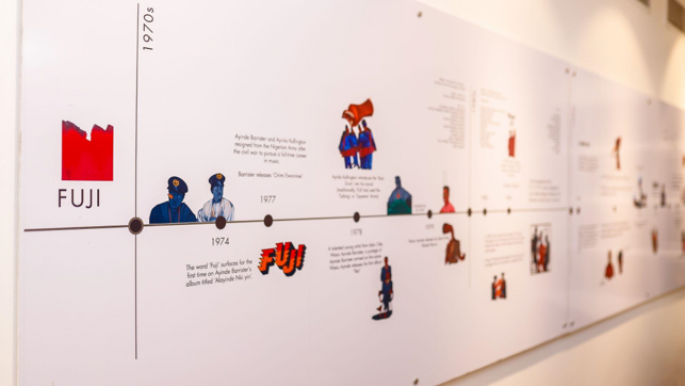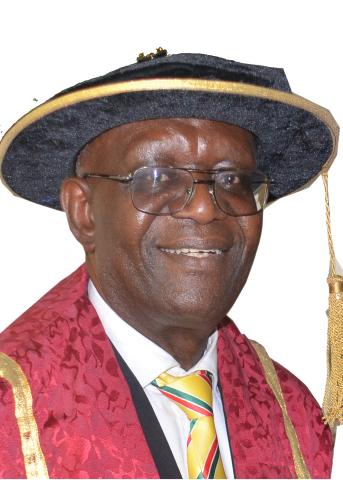First published Adama Munu of Arab News
Before Afrobeat, there was fuji. This local Nigeria’s musical imprint is known worldwide, but less is known about the Yoruba Muslims’ contribution to its success. Fuji music is at the forefront of this sound, with its origins in prayer, devotion, and rhythm.
The first time I heard fuji music was in 2010 at my Nigerian friend’s wedding party in South London.
I still remember the catchy upbeat rhythms from the ensemble of tracks that played which were made up of a unique drumming tradition, specific to her ethnic group.
What I did not know at the time was how Islamic spirituality is central to its story.
“Dating back to colonial times, wéré music was traditionally performed by urban, working-class young people to keep Muslim communities entertained during Ramadan nights or to wake them for the pre-dawn meal before fasting”
A pop-up exhibition, Fuji: A Opera is making its international debut at London’s Africa Centre to introduce this unique musical genre to new and old audiences. It will include never before seen archive footage artefacts and installations and highlight the origins of fuji music, and its rich subculture from the 1960s to the present day.
The exhibition’s founder, Bobo Omotayo told me that now feels like the perfect time to celebrate the phenomenal influence of fuji music, how it began and its lasting impact. “Without fuji, there would be no Afrobeats. With London’s huge Nigerian community and close links with Lagos, I’m proud to be bringing Fuji: A Opera to the Africa Centre this summer.”
The exhibition premiered in 2020 the pandemic in Nigeria, and the organisers say it’s the most extended showcase of the fuji subculture today.
The exhibition will display rare instruments from Nigeria that have been played since the genre emerged over 50 years ago. These have been donated by some iconic fuji artists, and will also pay homage to Yoruba Muslim communities on Lagos Island who invented the musical origins of fuji music in what is known as wéré music or ajisari which means ‘waking up for suhoor’ in the Yoruba language.

The Ramadan roots
Dating back to colonial times, wéré music was traditionally performed by urban, working-class young people to keep Muslim communities entertained during Ramadan nights or to wake them for the pre-dawn meal before fasting. This is a tradition that is in the same spirit as the drumming that is often played on the streets of Istanbul to wake Muslims up for suhoor. Wéré music is heavily set in providing spiritual messages praising Allah or other reminders that are linked with the Islamic faith.
There are two schools of thought on where the name fuji originates from. One says it comes from the Yoruba word which means to party, and then the second school of thought refers to Alhaji Sikiru Ayinde Barrister who said he came up with the name after seeing a poster at an airport advertising Mount Fuji, the highest peak in Japan. Like wéré music, fuji music is largely played using percussion instruments like the ‘talking drum’ or gangan.
Socio-political issues, ethics and historical events are key themes that set the tone for traditional fuji music. Nigerian culture consultant, Jídé Taiwo, tells The New Arab that “in the 1960s, fuji music was only just being formed as Barrister himself was still serving in the Nigerian army at that time. His music then was largely religious-inspired with a dose of secularism, such as records Let’s Do God’s Will and Mecca Special.
The Fuji’s dominance
Musical genres are never static. They evolve to reflect the tastes, cultures and preferences of newer generations and other host communities who produce and reinterpret them. The same happened to wéré music. “What fuji did was incorporate some dance. The traditional track would start off with praises to Allah or Qur’anic references. Over time, fuji artists toned down Islamic references for cross-over appeal, but those who were unashamedly Muslim, would create a dance format on side A of the cassette and side B would be more Islamic,” Bobo says.
The genre evolved to include musicians from other communities, different themes and instruments like the piano and the Hawaiian guitar. Towards the end of the colonial period in the 1950s and 1960s, many performance groups emerged in other cities like Ibadan and Ilorin, the most notable of whom include Sikiru Omo Abiba, Kasali Alani, Saka Olayigbade, Ayinla Yekinni.
Musicians like the London Special, Fuji Reggae and Kollington Ayinla broke through in the 1970s with an eclectic feel while fuji musicians in the 1980s (which is noted as fuji music’s golden era) began using synthesisers with hits like Fuji Garbage and American Special. During the 1990s, King Wasiu Ayinde Marshall who worked closely with Barrister became a trailblazer with records like American Tips and Consolidation.
Nigerian songwriter, Beautiful Nubia says: “At the beginning, it was the music of the Muslims…. and then it changed and became a bit faster, at some point, it earned fans from across the country. But it also used also be the music of the poor. The more elitist Yorubas would listen to foreign music or juju music or highlife. And the poor people listened to fuji. But now I think it’s gone beyond that. It cuts across all classes.”
While fuji music’s popularity can be traced to its ‘party appeal’, its emergence as Nigeria’s post-colonial era progressed invited scores of political and social commentaries, not quite unlike what Fela Kuti’s Afrobeat movement was doing around the same time.
“Fela Kuti’s music was only a part of his larger-than-life life (apologies for the pun) because of his never-ending run-ins with Nigeria’s military governments. But fuji did reflect the times as well, perhaps more than Afrobeat because of its reach among the Yoruba people. Each musician made it a point to have a socio-political theme in each of their records. For example, both Barrister and Kollington had albums that discussed Nigeria’s 1983 election and transition, which was eventually truncated by yet another coup only three months later. KWAM1 too released Adieu Awolowo in 1987 to mark the passing of the country’s political leader Obafemi Awolowo,” Jídé explains.
Fuji’s future
Fuji music is still popular among Yoruba Muslims and an overwhelming majority of performers come from that community. Due to the secular nature of the genre, it is often not played among religious circles but “it’s a generally accepted fact that fuji music came from a Muslim background despite its cross-religious appeal. Also, because it’s been successful for five decades, upcoming musicians do not necessarily have to start from the mosque because the skills can be acquired from older performers and as such, that mosque-to-stage pipeline is no longer as important as it used to be,” Jídé tells The New Arab.
This mirrors how American gospel music was the training ground from which r&b and pop artists with Black American heritage emerged, such as the late Aretha Franklin, Luther Vandross and Whitney Houston, Faith Evans, Ledisi and John Legend. But today, a foothold in the Black Church’s musical tradition is no longer an expectation or backstory for today’s singers in the mainstream, and this speaks to the changing articulation of what counts as a ‘guarantor’ for one’s musical talent and prospective success.
Today there is very little tension in the articulation of genres like Afrobeats music (which is not to be confused with Fela Kuti’s Afrobeat movement). It is a primarily secular musical enterprise from West African countries like Nigeria with a host of popular artists like Wizkid, Burna Boy, Yemi Alade and Tems. The genre’s pioneers have accrued millions of streams on platforms like Spotify and are selling out some of the world’s largest stadiums. For instance, Tiwa Savage will make history as the first female Afrobeats star to headline London’s iconic Wembley Arena in November.
Earlier in June, Spotify launched Afrobeats: Journey of a Billion Streams, a dedicated site tracking all things related to the genre. Jocelyne Muhutu-Remy, Spotify’s Managing Director for Sub-Saharan Africa said, “There is no doubt that Afrobeats as a genre is here to stay and will only continue to shatter more ceilings. In 2023 alone, the genre will have been played for more than 223 million hours, with streams exceeding 7.1 billion on Spotify. We created this site for both new and longtime fans of the genre who would like to have a better understanding of how and where this explosive sound came to be.”
Fuji music has not made the same inroads as Afrobeats primarily due to its music composition and stage aesthetic.
The typical traditional fuji record is meant for live performances and weddings which is why it’s extensive averaging about 18 minutes per song which is why, as Bobo tells me, “Fuji musicians have never been able to present themselves the way Afrobeat artists do, because the formula is that you record a hit single, you make a video for it, and then you promote it on radio, but it’s hard for radio stations to play an 18 minute single.
“I am really interested to see how the next generation of fuji artists adapt to this cookie-cutter template. If you think about the Afrobeats artists who are sampling references from this genre, fuji music is clearly a blueprint. I think it is a wonderful way of reimagining our past and imagining our future,” Bobo concludes.
The exhibition runs for several days from 18 to 28 August 2023. You can get tickets here: fujiopera.com
Adama Juldeh Munu is an award-winning journalist that’s worked with TRT World, Al-Jazeera, the Huffington Post, Middle East Eye and Black Ballad. She writes about race, Black heritage and issues connecting Islam and the African diaspora
Follow her on Twitter: @adamajmunu


 Main Story2 years ago
Main Story2 years ago
 News3 years ago
News3 years ago
 Featured3 years ago
Featured3 years ago
 Business2 years ago
Business2 years ago
 Sports1 year ago
Sports1 year ago
 Main Story1 year ago
Main Story1 year ago
 News2 years ago
News2 years ago
 Economy2 years ago
Economy2 years ago









